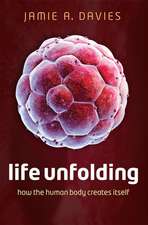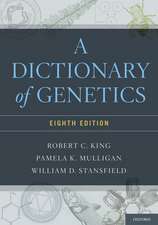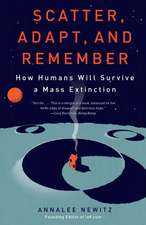Darwin's Dice: The Idea of Chance in the Thought of Charles Darwin
Autor Curtis Johnsonen Limba Engleză Hardback – 23 oct 2014
Preț: 234.66 lei
Preț vechi: 290.22 lei
-19% Nou
Puncte Express: 352
Preț estimativ în valută:
44.90€ • 46.88$ • 37.16£
44.90€ • 46.88$ • 37.16£
Carte tipărită la comandă
Livrare economică 24-31 martie
Preluare comenzi: 021 569.72.76
Specificații
ISBN-13: 9780199361410
ISBN-10: 019936141X
Pagini: 288
Ilustrații: 14 illustrations
Dimensiuni: 155 x 236 x 28 mm
Greutate: 0.5 kg
Editura: Oxford University Press
Colecția OUP USA
Locul publicării:New York, United States
ISBN-10: 019936141X
Pagini: 288
Ilustrații: 14 illustrations
Dimensiuni: 155 x 236 x 28 mm
Greutate: 0.5 kg
Editura: Oxford University Press
Colecția OUP USA
Locul publicării:New York, United States
Recenzii
Voted one of Amazon's Best Books of the Month in October 2014.
Curtis Johnson has meticulously examined the role of chance in Darwinian evolution and produced a superlative study.
Johnson's book is well written and admirably thorough ... [I]f you have read one (or a few) of Darwin's published books and would like a look inside Darwin's mind, via the lens of his notebooks and correspondence, I heartily recommend this book. The concept of 'chance' quickly takes us right to the heart of what makes Darwin such an interesting and important thinker, and Johnson shows us exactly why this is the case.
Johnson's meticulous work provides an answer to the question of Darwins thoughts on chance and, not incidentally, discusses his often-debated religious beliefs. Darwins Dice will be relevant to historians of philosophy and science, especially to those with a deep interest in Darwin himself.
Of interest to specialists in game theory or philosophy, as well as natural selection scholars
Darwin believed, or was expected to believe, that every event has a cause, that causes instantiate natural laws, and that God is the author of these laws. How do these principles sort with random variation as a necessary condition of adaptive natural selection? Not well. What did Darwin do about it? In this close reading of the relevant texts, Johnson argues that he accepted randomness, but seemed almost relieved that his ignorance did not force him to say so. I recommend Darwin's Dice to anyone who wants to see a great mind wrestling with a great challenge.
Taking advantage of a wealth of manuscripts, letters, and publications, Curtis Johnson presents a splendid analysis of the role of chance in Darwin's philosophy as well as his science. The book is a major contribution to our understanding of how Darwin struggled to make sense of his ideas and to explain them to the scientific community.
Chance, a seemingly simple but often misunderstood concept, becomes even more difficult to grasp when applied to understanding the sources of variation seen within species. Curtis Johnson adeptly and thoroughly lays out for the reader the role chance played in Darwin's developing ideas of variation. The author demonstrates that even though Darwin expressed the importance of chance to his readers, he tended to mask it in other verbiage in order to make it more palatable to the public and other scientists.
I would recommend this book ... to a somewhat specialized audience -- readers who want to look carefully into this aspect of Darwin's thought, scholars who want to explore how biology acquired its unique definition of randomness, and anyone interested in exploring the way contemporary culture understands chance.
Curtis Johnson has meticulously examined the role of chance in Darwinian evolution and produced a superlative study.
Johnson's book is well written and admirably thorough ... [I]f you have read one (or a few) of Darwin's published books and would like a look inside Darwin's mind, via the lens of his notebooks and correspondence, I heartily recommend this book. The concept of 'chance' quickly takes us right to the heart of what makes Darwin such an interesting and important thinker, and Johnson shows us exactly why this is the case.
Johnson's meticulous work provides an answer to the question of Darwins thoughts on chance and, not incidentally, discusses his often-debated religious beliefs. Darwins Dice will be relevant to historians of philosophy and science, especially to those with a deep interest in Darwin himself.
Of interest to specialists in game theory or philosophy, as well as natural selection scholars
Darwin believed, or was expected to believe, that every event has a cause, that causes instantiate natural laws, and that God is the author of these laws. How do these principles sort with random variation as a necessary condition of adaptive natural selection? Not well. What did Darwin do about it? In this close reading of the relevant texts, Johnson argues that he accepted randomness, but seemed almost relieved that his ignorance did not force him to say so. I recommend Darwin's Dice to anyone who wants to see a great mind wrestling with a great challenge.
Taking advantage of a wealth of manuscripts, letters, and publications, Curtis Johnson presents a splendid analysis of the role of chance in Darwin's philosophy as well as his science. The book is a major contribution to our understanding of how Darwin struggled to make sense of his ideas and to explain them to the scientific community.
Chance, a seemingly simple but often misunderstood concept, becomes even more difficult to grasp when applied to understanding the sources of variation seen within species. Curtis Johnson adeptly and thoroughly lays out for the reader the role chance played in Darwin's developing ideas of variation. The author demonstrates that even though Darwin expressed the importance of chance to his readers, he tended to mask it in other verbiage in order to make it more palatable to the public and other scientists.
I would recommend this book ... to a somewhat specialized audience -- readers who want to look carefully into this aspect of Darwin's thought, scholars who want to explore how biology acquired its unique definition of randomness, and anyone interested in exploring the way contemporary culture understands chance.
Notă biografică
Curtis Johnson is a Professor of Government at Lewis & Clark College. He has published many articles and chapters on the history of science and Darwinist thought.












